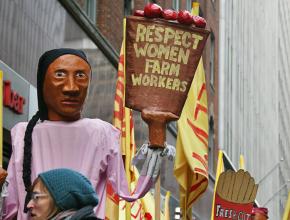Wendy’s old-fashioned greed
and report on the efforts by farmworkers to demand dignity and fair treatment from the fast-food chain Wendy's.
NEARLY 100 members of the Coalition of Immokalee Workers (CIW) and their allies organized a five-day hunger strike in mid-March outside the Manhattan office of billionaire Nelson Peltz, who is Wendy's CEO as well as its largest shareholder.
The action culminated with a March 15 march of 2,000 people, led by the children of farmworkers, from Dag Hammarskjold Plaza to Peltz's office.
Wendy's has so far refused to sign on to the Fair Food Program, a monitoring program established in 2011 by the farmworkers advocacy organization Coalition of Immokalee (CIW) and its allies to prevent abuse of farmworkers by the fast-food industry.
Taking a cue from the Time's Up movement, a major focus of the march was the issue of sexual harassment and assault faced by female farmworkers. A 2010 study of farmworkers in California's Central Valley found that 80 percent suffered such abuse on the job.
Farmworkers are excluded from the National Labor Relations Act of 1935--and they were excluded from the Fair Labor Standards Act of 1938 until 1966. To this day, according to federal law, farmworkers have no right to overtime pay, and workers on small farms are not entitled to the minimum wage.

Despite the lack of formalized federal protection for the right of farmworkers to organize, the CIW has been fighting for farmworkers since the early 1990s. The CIW's Fair Food Program represents a partnership between farmworkers, crop growers and retail buyers to ensure higher wages and protection for farmworkers' rights to a safe work environment, free of sexual harassment and retaliation.
The program is an effort to demand corporate accountability and social responsibility, and is driven by farmworkers themselves, who know best how to monitor their own working conditions. The compliance agreements between participating buyers and the CIW are legally binding.
Fast-food giant Wendy's has thus far refused to join the Fair Food Program, opting to cease purchasing from suppliers in Florida who abide by the Fair Food Program's guidelines, and instead purchasing tomatoes from Mexico.
Though Wendy's insists it has shifted production to Mexico because the tomatoes are of higher quality, it's no coincidence the decision was made after the Fair Food Program was incorporated in Florida.
Wendy's claims that it is committed to its own code of conduct, assessed by third-party human rights groups. This is an example of an opaque corporate "social responsibility" program that does not have workers' best interests at heart and is not accountable to them.
THE FARMWORKERS' action targeted 280 Park Avenue in Manhattan, where hedge-fund manager and billionaire Nelson Peltz, who is Wendy's board chair, has his headquarters.
The fasting farmworkers were joined by student groups, religious groups, labor unions and other workers' organizations from around the country in a show of solidarity that swelled the march's numbers to nearly 2,000 people.
The mood was festive, yet resolute as marchers chanted and carried yellow-and-red flags, as well as handmade and printed signs calling for justice, dignity, respect and an end to sexual violence against farmworkers.
In addition to the CIW contingent from Florida, many marchers had traveled hundreds of miles to show their support.
The CIW has taken on fast-food giants successfully before. In 2005, Taco Bell agreed to meet demands for improved working conditions and wages after a four-year boycott. By 2008, McDonald's, Burger King and Subway had also capitulated under pressure from farmworkers and consumers alike to improve conditions for farmworkers.
Wendy's is the last major U.S. fast-food chain holdout. It has cynically claimed that the CIW is "trying to exploit the positive momentum that has been generated by and for women in the #MeToo and Time's Up movement to advance their interests," according to a Wendy's spokesperson.
But even one of the most visible mainstream voices of the Time's Up movement, Alyssa Milano, tweeted and posted a statement on Facebook in support of farmworkers.
This drew an important connection between the high-profile cases of sexual abuse in Hollywood and the often-overlooked struggles of low-wage female workers, whose exploitation doesn't make headlines--and it highlighted the necessity of struggle for women's rights and against sexual violence in all professions and walks of life.
Wendy's has yet to take the farmworkers' demonstrations seriously--but it will have to as the pressure from Hollywood actresses, students, and other farm and food-service workers mounts.
The struggle continues, and those marching and fasting only seem more committed. In the words of one participant:
[W]ith the kids here and with our own children as well, we planted a seed in them, and tomorrow it will grow to strengthen the power we have with you from inside of them. And do you know who has accomplished nothing? Nelson Peltz, who has failed to uproot the greed from his heart.


